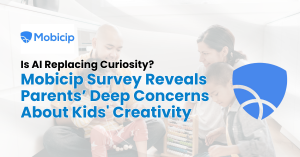Mobicip Survey: 7 in 10 U.S. Parents Concerned AI May Limit Kids' Creativity and Curiosity
Mobicip’s 2025 survey of 1,000 parents highlights growing concerns about AI’s impact on children's creativity, curiosity, and learning behaviors.
CALIFORNIA, CA, UNITED STATES, April 28, 2025 /EINPresswire.com/ -- A new national survey by Mobicip, a leading digital parenting platform, reveals growing concern among U.S. parents about the impact of artificial intelligence (AI) tools on their children’s learning, creativity, and independence. Conducted in April 2025 among 1,000 Mobicip users across the United States, the study sheds light on how AI is reshaping childhood experiences—and not always for the better.
AI Is Everywhere, and Parents Are Paying Attention
With generative AI tools becoming more accessible to children—from AI-powered tutors to image generators and music creators—parents are raising red flags over potential long-term effects on learning behaviors and imagination.
The survey found that 42% of parents are very familiar with AI tools like ChatGPT, Alexa, or smart learning platforms. Additionally, 28% reported that their children use AI tools regularly, while 41% said their children use them occasionally. Only 6% of parents indicated they were unfamiliar with such tools.
One parent respondent from Colorado noted, “I wasn’t prepared for how quickly AI tools would become part of my child’s schoolwork and hobbies. It all happened so fast.”
Creativity and Curiosity Are Taking a Hit
Parents are especially concerned about how AI may be stifling children's originality and natural inquisitiveness. According to the survey results, 71% of parents believe AI tools may reduce creativity and imagination. Furthermore, 59% said AI is making their children less curious or less likely to explore answers on their own. An additional 44% of parents expressed concern that their children are becoming increasingly dependent on AI for solutions rather than problem-solving independently.
A parent from Washington shared, “My son used to spend hours on his keyboard, experimenting with sounds. Now he just types into a music AI. He’s stopped making his own tunes.”
Parents Call for Stricter AI Controls
In response to these concerns, parents are demanding stronger safeguards around AI use, particularly for children under the age of 13. The survey revealed that 85% of parents support stricter parental controls or platform restrictions for younger users. Additionally, 61% of parents said they would actively use a tool that allows them to filter or review their child’s AI interactions.
According to a father from Texas, “AI isn’t like a regular app. It talks, answers, and teaches—without us knowing what’s being said. That’s why filters and monitoring are absolutely necessary.”
Monitoring Shifts From Screen Time to Content Supervision
As AI grows more conversational and context-based, parental supervision needs are evolving beyond traditional screen time limits. The survey found that 37% of parents already closely monitor their child’s AI use, while 40% said they do so occasionally.
When asked about desired features for AI monitoring tools, parents prioritized options such as interaction logs, alerts for misleading or inappropriate content, and AI usage reports.
One parent respondent from Illinois observed, “We’ve got controls for video games and YouTube, but AI feels like a black box. We need visibility into what it’s teaching or influencing.”
Parents Want AI That Supports, Not Substitutes
While many parents recognize the convenience of AI, most believe it should enhance, not replace, traditional forms of learning, creativity, and human connection. According to the survey, 52% of parents worry that AI could eventually replace real-world play, learning, and interaction. Furthermore, 81% expressed support for the development of child-specific AI tools that encourage critical thinking and creativity, rather than automating tasks or offering shortcuts.
A mother from New York remarked, “Let kids explore, fail, try again. That’s how they grow. AI should guide them, not do the thinking for them.”
About the Survey
The Mobicip AI & Kids Survey was conducted in April 2025 among 1,000 parents actively using the Mobicip parental control platform. Respondents were parents of children between the ages of 6 and 17, representing a diverse mix of urban, suburban, and rural regions across the United States. The survey featured 10 structured multiple-choice questions exploring topics including:
- Awareness and usage of AI tools
- Impact of AI on creativity and curiosity
- Parental concerns and safety considerations
- Monitoring and control preferences
Views on the evolving role of AI in childhood development
Final Thought
As AI continues to integrate into children's academic and personal lives, U.S. parents are calling for thoughtful digital safeguards that preserve creativity, curiosity, and critical thinking.
More detailed insights from the Mobicip AI & Kids Survey are available in Mobicip’s latest blog post: What US Parents Really Think About AI & Its Influence on Kids.
Additional information about Mobicip’s digital parenting solutions can be found on the official website or by contacting the media team.
Anitha Swaminathan
Mobicip
+1 805-380-5687
email us here
Visit us on social media:
LinkedIn
Instagram
Facebook
YouTube
X
Legal Disclaimer:
EIN Presswire provides this news content "as is" without warranty of any kind. We do not accept any responsibility or liability for the accuracy, content, images, videos, licenses, completeness, legality, or reliability of the information contained in this article. If you have any complaints or copyright issues related to this article, kindly contact the author above.
LEDFoil's in-ice LED display to bring a new era of advertising to HC Dukla Jihlava
TIGHITCO LATIN AMERICA ANNOUNCES NEW COMMERCIAL AGREEMENT WITH AIRBUS CANADA
Mindall CRM Enters the UAE Market with Advanced PropTech Tools and Developer Integrations for Real Estate Professionals
Kalendarium
Więcej ważnych informacji
 Jedynka Newserii
Jedynka Newserii

 Jedynka Newserii
Jedynka Newserii

Prawo

Trwają dyskusje nad kształtem unijnego budżetu na lata 2028–2034. Mogą być rozbieżności w kwestii Funduszu Spójności czy dopłat dla rolników
Trwają prace nad wieloletnimi unijnymi ramami finansowymi (WRF), które określą priorytety wydatków UE na lata 2028–2034. W maju Parlament Europejski przegłosował rezolucję w sprawie swojego stanowiska w tej sprawie. Postulaty europarlamentarzystów mają zostać uwzględnione we wniosku Komisji Europejskiej w sprawie WRF, który zostanie opublikowany w lipcu 2025 roku. Wciąż jednak nie ma zgody miedzy państwami członkowskimi, m.in. w zakresie Funduszu Spójności czy budżetu na rolnictwo.
Konsument
35 proc. gospodarstw domowych nie stać na zakup mieszkania nawet na kredyt. Pomóc może wsparcie budownictwa społecznego i uwolnienie gruntów pod zabudowę

W Polsce co roku oddaje się do użytku ok. 200 tys. mieszkań, co oznacza, że w ciągu dekady teoretycznie potrzeby mieszkaniowe społeczeństwa mogłyby zostać zaspokojone. Jednak większość lokali budują deweloperzy na sprzedaż, a 35 proc. gospodarstw domowych nie stać na zakup nawet za pomocą kredytu. Jednocześnie ta grupa zarabia za dużo, by korzystać z mieszkania socjalnego i komunalnego. Zdaniem prof. Bartłomieja Marony z UEK zmniejszeniu skali problemu zaradzić może wyłącznie większa skala budownictwa społecznego zamiast wspierania kolejnymi programami zaciągania kredytów.
Problemy społeczne
Hejt w sieci dotyka coraz więcej dzieci w wieku szkolnym. Rzadko mówią o tym dorosłym

Coraz większa grupa dzieci zaczyna korzystać z internetu już w wieku siedmiu–ośmiu lat – wynika z raportu NASK „Nastolatki 3.0”. Wtedy też stykają się po raz pierwszy z hejtem, którego jest coraz więcej w mediach społecznościowych. Według raportu NASK ponad 2/3 młodych internautów uważa, że mowa nienawiści jest największym problemem w sieci. Co więcej, dzieci rzadko mówią o takich incydentach dorosłym, dlatego tym istotniejsze są narzędzia technologiczne służące ochronie najmłodszych.
Partner serwisu
Szkolenia

Akademia Newserii
Akademia Newserii to projekt, w ramach którego najlepsi polscy dziennikarze biznesowi, giełdowi oraz lifestylowi, a także szkoleniowcy z wieloletnim doświadczeniem dzielą się swoją wiedzą nt. pracy z mediami.










.gif)

 |
| |
| |
|